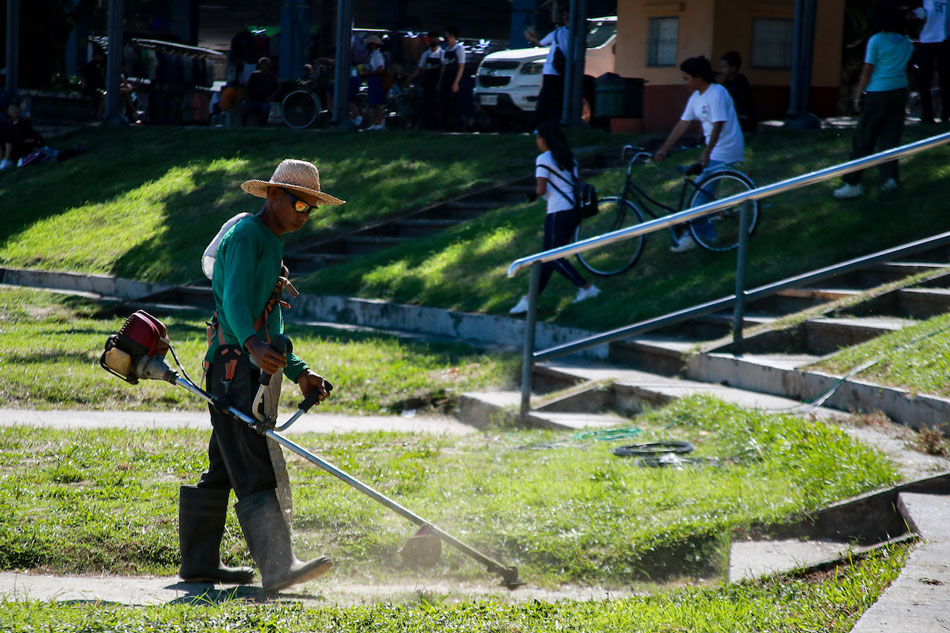Expect hotter days in May before rainy season begins: PAGASA | ABS-CBN
ADVERTISEMENT

Welcome, Kapamilya! We use cookies to improve your browsing experience. Continuing to use this site means you agree to our use of cookies. Tell me more!
Expect hotter days in May before rainy season begins: PAGASA
Expect hotter days in May before rainy season begins: PAGASA
Ariel Rojas,
ABS-CBN News
Published Apr 26, 2023 05:23 PM PHT
|
Updated May 03, 2023 02:57 PM PHT
Up to 14 storms inside PAR from May to October
Up to 14 storms inside PAR from May to October
MANILA — Hotter and more humid conditions could be experienced in May before the rainy season begins, state weather bureau PAGASA warned on Wednesday.
MANILA — Hotter and more humid conditions could be experienced in May before the rainy season begins, state weather bureau PAGASA warned on Wednesday.
Temperatures may reach up to 40 degrees Celsius in Northern Luzon, over 39 degrees Celsius in the lowlands of Luzon, above 38 degrees Celsius in the lowlands of Mindanao, and between 36 to 38 degrees Celsius in Metro Manila, according to the weather agency.
Temperatures may reach up to 40 degrees Celsius in Northern Luzon, over 39 degrees Celsius in the lowlands of Luzon, above 38 degrees Celsius in the lowlands of Mindanao, and between 36 to 38 degrees Celsius in Metro Manila, according to the weather agency.
State climatologists, meanwhile, forecast that the rainy season will start between the second half of May and the first half of June — the normal onset of the season.
State climatologists, meanwhile, forecast that the rainy season will start between the second half of May and the first half of June — the normal onset of the season.
Near-normal rainfall is forecast from May to September over most parts of the country.
Near-normal rainfall is forecast from May to September over most parts of the country.
ADVERTISEMENT
Above-normal rainfall, however, is expected in some areas of Northern and Central Luzon beginning in July.
Above-normal rainfall, however, is expected in some areas of Northern and Central Luzon beginning in July.
By August, parts of the Bicol Region, Visayas, and Mindanao will have below-normal precipitation.
By August, parts of the Bicol Region, Visayas, and Mindanao will have below-normal precipitation.
More areas in Luzon, including Metro Manila, and some parts of Visayas and Mindanao, meanwhile, will receive less rain by October.
More areas in Luzon, including Metro Manila, and some parts of Visayas and Mindanao, meanwhile, will receive less rain by October.
EL NIÑO
The agency said that the switch from ENSO-neutral conditions to El Niño is favored during May-July 2023.
The agency said that the switch from ENSO-neutral conditions to El Niño is favored during May-July 2023.
Higher chances of the condition prevailing also increase until the first quarter of 2024.
Higher chances of the condition prevailing also increase until the first quarter of 2024.
ADVERTISEMENT
El Niño is the warm phase of a naturally-occurring climate pattern which leads to less rainfall and eventual dry spells and drought.
El Niño is the warm phase of a naturally-occurring climate pattern which leads to less rainfall and eventual dry spells and drought.
State climatologists also showed that from the August-September-October period, there is an above 80 percent chance that this year's El Niño episode will be "weak" and above 50 percent possibility that it will be "moderate."
State climatologists also showed that from the August-September-October period, there is an above 80 percent chance that this year's El Niño episode will be "weak" and above 50 percent possibility that it will be "moderate."
STORMS
Ten to 14 tropical cyclones are forecast to enter or form inside the Philippine area of responsibility from May to October, with two to four storms expected in July.
Ten to 14 tropical cyclones are forecast to enter or form inside the Philippine area of responsibility from May to October, with two to four storms expected in July.
During El Niño, more cyclones form during July.
During El Niño, more cyclones form during July.
While stronger cyclones — typhoons and super typhoons — tend to form in September, there are more landfalling strong systems during October and November.
While stronger cyclones — typhoons and super typhoons — tend to form in September, there are more landfalling strong systems during October and November.
ADVERTISEMENT
The first storm of the year developed this April and was named Amang.
The first storm of the year developed this April and was named Amang.
For more updates, visit the ABS-CBN weather center.
ADVERTISEMENT
ADVERTISEMENT



